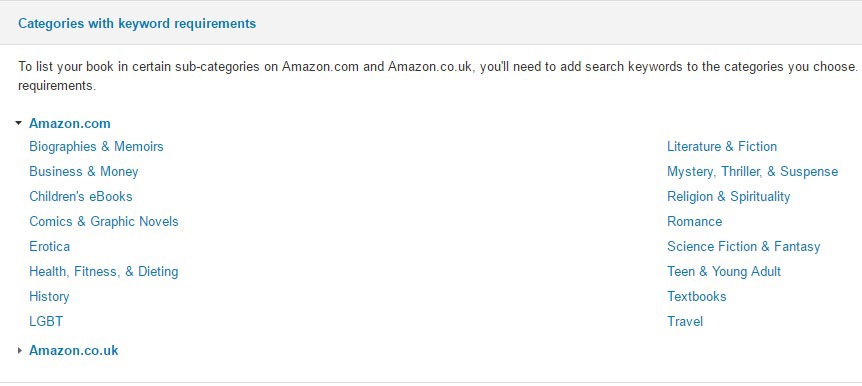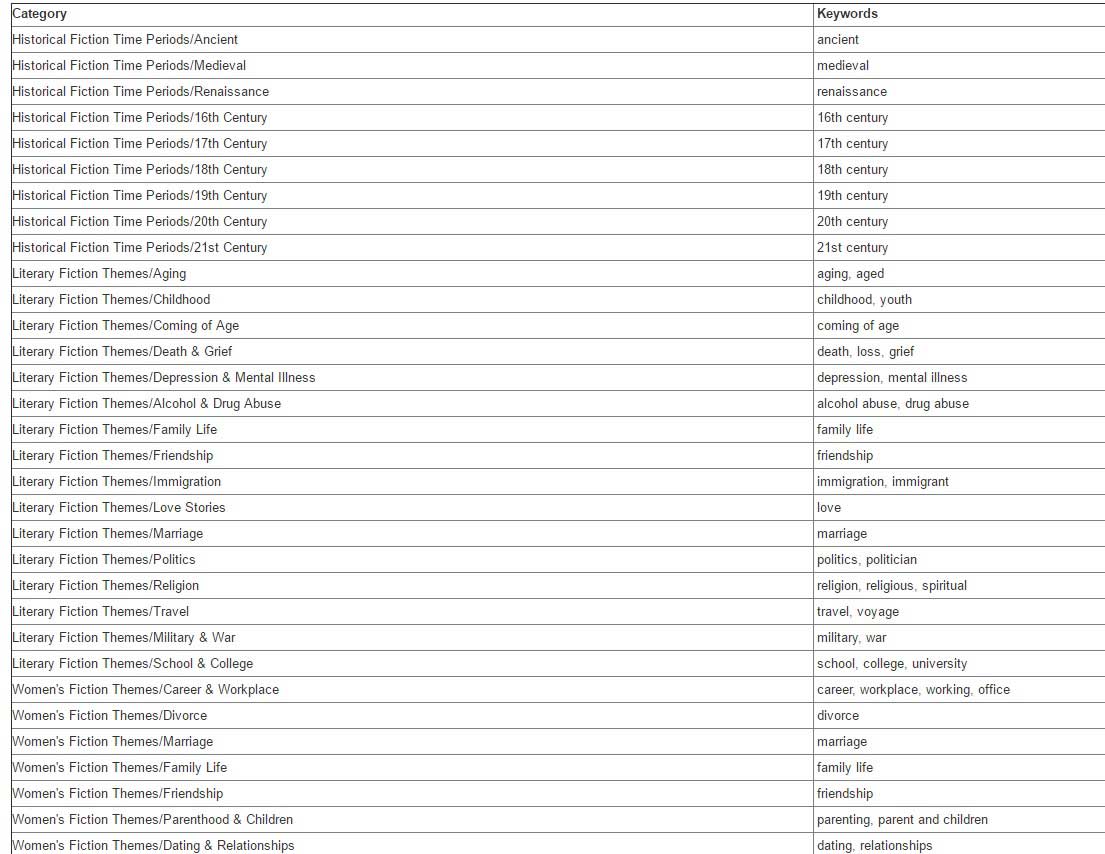 I hate keywords. “Use keywords,” they say, for your blog post, your KDP book, your website, your AMS ads. Figuring out which keywords to use is harder for me than writing the actual post/book/ad. But I’m learning.
I hate keywords. “Use keywords,” they say, for your blog post, your KDP book, your website, your AMS ads. Figuring out which keywords to use is harder for me than writing the actual post/book/ad. But I’m learning.
An example: the other day while checking the Amazon rank of one of my books after a sale, I noticed something odd. The rank in three different categories was showing. The first one was:
Books>Literature and Fiction>Genre Fiction>Historical>Cultural Heritage
That made sense. I’d selected cultural heritage as one of my categories upon publishing. The book is historical fiction, set deep in the Appalachian Mountains. The culture of that area during that time period is central to the story.
But the next line looked like this:
Kindle>Kindle Ebooks>Art, Music, and Photography>Drama & Theater.
The third line was even weirder:
Kindle Store>Whispersync for Voice>Drama
What the heck was going on? I went to my KDP Dashboard to check my categories. We’re only allowed two, and mine were Historical Fiction and Cultural Heritage. Nothing about drama, plays, or Whispersync.
Then I happened to notice my keywords, and there it was: Drama. Sitting right there in the middle of my keywords. Surely that wasn’t why those categories were showing on my Amazon product page. Then I did some searching, and what I learned was interesting.
I had always assumed the keywords we add on the book’s detail page when we’re uploading to KDP were solely to help customers searching those particular terms come across our book. My book is full of drama, so that seemed like a reasonable keyword to select. And they do do that, but they do more than that, as well.
Have you ever noticed other books that happen to be in categories you think would be perfect for your book, but no matter what categories you select, it just doesn’t seem to land there? For example, you wrote a psychological thriller, but the only category available under “Fiction” is just plain “Psychological.” But you know there has to be a psychological thriller category, even a psychological suspense category, because you’ve seen other books in those specific categories. How do they get there?
Keywords. In fact, some KDP categories actually require specific keywords. On KDP’s helpful Selecting Browse Categories page, which I’d obviously neglected to read, they give a whole list of categories that need keywords, complete with the keywords needed to help your book land where you want it to land. If you click on Categories with Keyword Requirements and then select Amazon.com, you’ll get the screen below:

Look at all those categories! If we click on one, we get a list of suggested keywords. For example, when we click on Literature and Fiction, we get a huge list that includes keywords for the categories historical fiction, literary fiction, and women’s fiction. Say you just wrote a book you’d categorize as women’s fiction. But that’s such a broad category, you want to narrow it down both to make it easier to find in a search, and to make sure it lands in the right spot in that category. The list below shows ten different categories for women’s fiction, depending on the specific keywords you choose to accurately reflect the book’s content:

It took some playing around, but I finally managed to get my books (yep, I had more than one in weird categories) into their correct categories, thanks to figuring out the correct keywords.
I also learned it’s probably good to read KDP help pages before publishing, but that’s another post.

I really hate keywords, trying to figure out the right ones to use is a nightmare. I have spent countless hours going through both categories and keywords, trying to make my books as visible as possible and I still don’t understand how I’ve ended up in some of the categories.
For example, the first book in my mystery series (I won’t name it because I don’t like to shamelessly plug, especially when commenting on someone else’s article) is listed in the following categories
Books > Literature & Fiction > Dramas & Plays > British & Irish
Books > Mystery, Thriller & Suspense > Thrillers & Suspense > Crime > Heist
Books > Mystery, Thriller & Suspense > Thrillers & Suspense > Crime > Kidnapping
Books > Teen & Young Adult
Kindle Store > Kindle eBooks > Children’s eBooks
Kindle Store > Kindle eBooks > Literature & Fiction > Drama & Plays > British & Irish
Kindle Store > Kindle eBooks > Mystery, Thriller & Suspense > Crime Fiction > Heist
Kindle Store > Kindle eBooks > Mystery, Thriller & Suspense > Crime Fiction > Kidnapping
Kindle Store > Kindle eBooks > Teen & Young Adult
I cannot even begin to fathom what it is doing in either Teen & Young Adult or Children’s ebooks because none of my chosen categories or keywords would get it even close to them.
The rest are fine because it’s a British set mystery about a kidnapping, which also features a heist (armed robbery actually but that’s the category it gives me) and has drama.
*shaking my head*
That one is confusing, Alex, if you’re sure you don’t have any keywords that would put it there. Are you also sure you didn’t check an age group during publishing that would get it there? Somewhere on the first page of setup, when entering details, we’re able to choose an age group.
If it’s neither of those reasons, I think I’d probably email KDP and ask them how to fix it. Having it show up as a children’s book when it isn’t could definitely hurt sales.
I’m published through Pronoun and they recently introduced age ratings, mine are all listed as trade books, since they don’t fit the 4-12 or 12-18 groupings. I have emailed Pronoun to see if there’s anything they can do, but they can’t fix it I’ll email Amazon direct.
Good luck – I hope you get it figured out soon.
Thanks Melinda. I think I have some checking to do.
Thanks for stopping by, Yvonne. I was really surprised to learn how much of an impact keywords have on the category.
Just one more thing that authors need to research and figure out! Thanks for this informative article.
LOL, you’re welcome, Stacie. It’s never-ending, isn’t it?
Yes, care is required. I once tried stuffing Gene Robinson and Episcopal in a keyword for my women’s fiction novel because his groundbreaking rise to bishop of New Hampshire as an openly gay man was a background element in my book. Suddenly my book was being ranked as science fiction>genetic engineering. AND also as Christian, which in practice is a category dominated by conservatives who sometimes rather enjoy leaving scathing reviews for books like mine. Not at all what I was going after!
Yikes! Yes, we definitely need to be careful. My books, while dramatic at times, definitely don’t fit into “plays” and “theater.”
Wow…THANK YOU! Tomorrow I’m going to study some keywords. 🙂
You’re welcome! 🙂
This was a great post! I went into all of my books on KDP and made multiple changes. Very useful. Thank you Melinda!
I hope they work well and result in many sales, Michael. 🙂 Thanks for stopping by.
This is a really fantastic little tidbit to know. Consider the info that’s already out there about keywords, it’s easy to assume that they are JUST for end user functionality. Knowing that on some services, they have other, internal functions is great info.
Thanks, Ben. It was something I’d honestly never thought of, but seeing my book in such weird categories spurred me to do some research.
Thank you, Melinda!
Great article! I went back and tweaked the keywords for both my books based on the info you provided.
Hope it works well for you, Craig. 🙂
Thank you! I pinned this article for future reference.
You’re welcome – thanks for stopping by.
Great post Malinda
Thanks, Elisabeth. 🙂
Thanks, I was wondering why one of my books had ended up in the categories that I hadn’t selected. I thought it may have had something to do with the user selection being from a category but your post made more sense.
Off to spend the rest of the week fixing it…
Good luck, and thanks for stopping by. 🙂
Yeah done with KU after the PageFlip program destroyed page reads. From $3K a month to $200. So many books appear as “1 page read”, even books no longer on KU were somehow getting counted, but of course as 1 page. Do yourself a favor. Abandon Amazon. Go wide. They have no intention of ever fixing their program, and they have no transparency to how they operate. You can give them all the data in the world and they will just say “sometimes slow months happen”. (As if that would account for a huge spike on a new release book being purchased, but only one person ever read one page on KU. Which you can easily disprove by having someone you know read your book and yet have it still report one page). There was a trick to disable pageflip. Many people started instantly seeing their earned money go back to what it was. Then they fixed the loophole that allowed books to be properly tracked again, and everyone’s pagereads instantly fell back to “1 page” again.
Get out of KU. It’s not worth it.
I’d heard about the page flip issue but didn’t completely understand it (all I have in KU are short stories, which don’t get much attention, anyway). Best of luck, B – I hope it all gets sorted out. I know it’s frustrating.
I guess this is proof that, if you want something done right, you have to do it yourself!
That’s what indie publishing is all about. 🙂
Thank you! I just updated my keywords to add better detail to better position the books into their niches. My WWII Japan civilian memoir now is in its specific search category showing only 1 other book, since it is a rare perspective (vs getting lost in a crowd of military memoirs). I also went into my CreateSpace account and changed some keywords. Here’s to more readers finding my books!
Nice job, Linda! 🙂
Thanks for this informative and helpful post. 🙂 — Suzanne
You’re welcome! Glad it’s helpful.
My women’s fiction book kept showing up in nonfiction categories and it was driving me batty. You explained in one post what no one could tell me after three phone calls to Amazon. Many thanks! ??
Yay! Hmm … maybe I should apply for a job there …. 😉